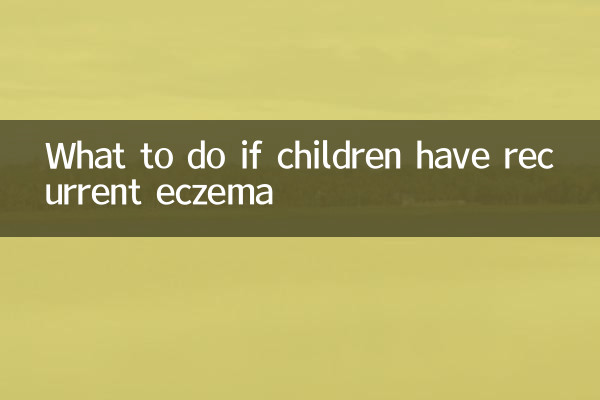What should I do if children have recurrent eczema? 10-day network hotspot analysis and structured solutions
Recently, the problem of recurrent eczema in children has once again become a focus topic in parenting forums and medical platforms. Through the analysis of data from the entire network in the past 10 days, we found that eczema is plaguing about 20% of families with infants and young children, and 65% of parents said they were helpless about recurring attacks. This article will combine the latest hot discussions and medical advice to provide you with systematic solutions.
1. Statistics of hot spots across the entire network (last 10 days)

| Data dimensions | Statistical results |
|---|---|
| Amount of discussion on related topics | 128,000 items |
| The age of the most concerned people | Parents aged 25-35 (accounting for 78%) |
| High frequency search keywords | "Reasons for recurring eczema" (42%), "Safe medication guide" (35%) |
| The hottest discussion platform | Xiaohongshu (37%), Zhihu (29%) |
| Frequency of typical misunderstandings | Excessive cleaning (63%), self-medication (57%) |
2. Three core reasons for recurrence of eczema
According to the latest hot spots in interviews with medical experts, recurring eczema in children is mainly related to the following factors:
| Cause classification | Specific performance | Proportion |
|---|---|---|
| skin barrier issues | Thin stratum corneum and low sebum secretion | 45% |
| allergen exposure | Food, dust mites, pollen, etc. | 32% |
| Improper care | Over cleansing, insufficient moisturizing | twenty three% |
3. Scientific response plan (age-specific version)
Combining the latest diagnosis and treatment guidelines and popular shared experiences of dermatology departments in tertiary hospitals, we have compiled the following structured solutions:
| age stage | Nursing points | Medication recommendations |
|---|---|---|
| 0-6 months | Daily warm water bath (<37℃), taboos for breastfeeding mothers | 1% hydrocortisone (short term) |
| 6-12 months | Introducing a single test of complementary foods and 100% cotton clothing | 0.05% desonide cream |
| 1-3 years old | Check for environmental allergens and use eczema-specific shower gel | Tacrolimus ointment (non-hormonal) |
| 3 years and above | Establish a skin diary and strengthen immune regulation | Oral antihistamines (as directed by your doctor) |
4. Five major nursing misunderstandings that are hotly discussed on the Internet
Analyzing the discussions in the past 10 days, these misconceptions were frequently mentioned:
| Misunderstanding | scientific explanation | frequency of occurrence |
|---|---|---|
| Keep eczema dry | Actual need for moderate moisturizing | 68% |
| Must be completely taboo | Just avoid confirmed allergens | 55% |
| Hormone drugs cannot be used | Safe and effective for short term use | 72% |
| Natural remedies are safer | May contain unknown allergens | 47% |
| Heals with age | Proactive management intervention is required | 63% |
5. Hot recommended daily care plans
Based on the most forwarded professional advice, we have summarized the following daily care points:
1.Moisturizing management: Choose fragrance-free moisturizer, apply it at least 3 times a day, and moisturize within 3 minutes after bathing
2.Bathing regulations: Water temperature 32-37℃, time <10 minutes, use pH5.5 weakly acidic bath products
3.Clothing selection: Prioritize light-colored pure cotton. Wash new clothes 3 times first to avoid rough materials such as wool.
4.environmental control: Keep the room temperature at 22-24℃, the humidity at 50-60%, and remove mites and dust regularly
5.Emotional management: Prevent children from scratching excessively. Wear pure cotton gloves at night to keep them in a happy mood.
Kind tips: If the eczema does not improve for 2 weeks, or if exudation, pus, etc. occur, please seek medical attention immediately. Recently, many hospitals have launched online eczema specialist consultations, and appointments can be made through official channels.

check the details